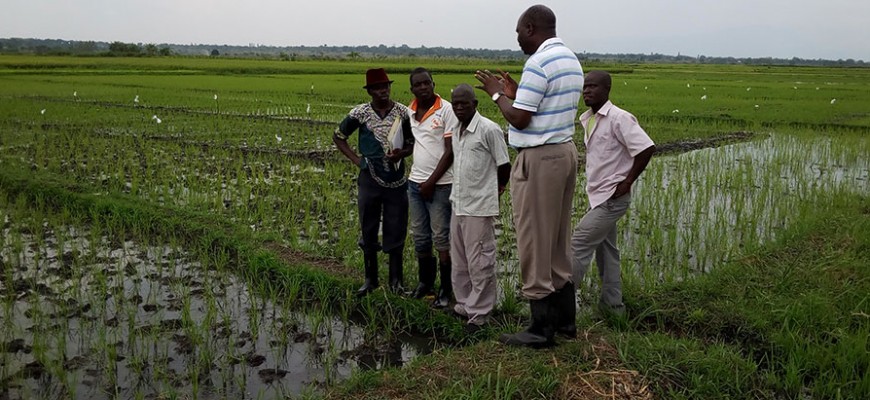
Scientists train rice farmers in Uganda on fertilizer use and application for improved yields
Soil nutrient depletion is one of the top most agricultural production constraints in Uganda, with over 80% of rice farmers perceiving this constraint to be one of the factors constraining crop yields. Yet, fertilizers are barely used, and yield responses to conventional NPK-fertilizers are poor. Micronutrients have been reported to enhance uptake efficiency of NPK, improving rice grain yields, profit margins, grain nutritional quality and disease tolerance. For instance, Sulphur, zinc, copper, magnesium, calcium, boron, iron and manganese applied in combination rather than individual micronutrients have been reported to increase yields of rice, maize, wheat, beans and potato in Ethiopia, Rwanda, Burundi and Mozambique by 20-70% above the yields realized with NPK alone. Similarly, improved yields of maize in Kenya, Malawi, Mali, Nigeria and Tanzania have been reported when micronutrients were applied in combination with NPK. In Uganda however, little is known about micronutrient fertilization in rice.
With regard to this, crop scientists from Africa Innovations Institute are currently conducting research on the rice crop with the emphasis of unraveling the contributions of micronutrients in addition to macronutrient fertilizer application in Uganda. The efforts to achieve this are covered under the ENRICH (Enhancing rice markets in Uganda through smart micronutrient fertilization) project that aims to address rice nutrient problems through testing and recommending best micro and macronutrient fertilizer combinations and application methods that give best yield results for farmers.
To do this, the scientists under the project have set up field experiments in Eastern Uganda on the two rice irrigation schemes of Doho in Butaleja District and Kibimba in Bugiri district. This has been successfully done with the involvement of Farmer Research Groups (FRGs) that are helping in trial monitoring and evaluation. These FRGs have been trained for their efficient involvement in evaluating the experiments, and selecting the best fertilizer combinations and management practices that will give the best rice yields and can be integrated into their current management practices.
The different fertilizers being evaluated are nitrogen (N), Phosphorus (P), Potassium (K), Zinc (Zn), Manganese (Mn), Boron (B), sulphur (S) and a commercial micronutrient fertilizer Elfert-F. “These have been applied at rates based on the results of soil analysis from the fields where the trials are being conducted.” Says AfrII Agronomist, Mr. Thomas Awio, also the lead technical supervisor of the experiments.
